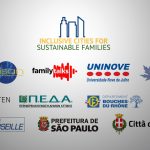
Family Support Services
and Impact of the Coronavirus Disease
on Food Security, Nutrition and Well-Being
Virtual Side-Event during the 54th session of the UN Commission on Population and Development
Presentation of the new OECD report
Wednesday, April 21st, 2021
10.00-11.30 am (New York Time)
PROGRAMME
Opening Remarks and Moderation
Nora Urrea
Vice President, IFFD
Presentation of the OECD Study Findings
Olivier Thévenon
Head of Child Well-Being Unit, OECD WISE Centre
In Times of Crisis, Valuing and Strengthening the Responses of Families Living in Poverty
Isabelle Pypaert Perrin
Director-General, International Movement ATD Fourth World
The Investment in Assistance, Research and Training to Fight Hunger
Maria Paula de Albuquerque
Clinical General Manager, CREN
Closing Remarks
Olivier Yao
President, IFFD
BACKGROUND NOTE
The fifty-fourth session of the United Nations Commission on Population and Development takes place from 19th to 23rd April 2021. The priority theme is “Population, Food Security, Nutrition and Sustainable Development.”
1. Presentation of the report on ‘Looking beyond COVID-19: Strengthening the role of Family Support Services’
The COVID-19 pandemic and the associated disruption of many education, health, social, and family services have emphasized their importance, including health care and mental health services, child protection, supports towards basic material needs such as food and housing, and specialized services for vulnerable families. For many families, a whole range of needs have to be addressed simultaneously, The challenge for policymakers is to develop a package of family services that address the needs of different families, both in crisis times and in the longer term, that is delivered in an integrated manner across different public agencies and a range of service providers.
The supply and quality of family support services vary across and often within countries. Strengthening countries’ family support delivery requires clear policy frameworks, appropriate funding of services, but also that service providers and policymakers have sound evidence about what works, for whom and under what circumstances. Sharing evidence on good service delivery practices and on efficient service organization is crucial to ensure that the services provide benefit to families who need them most.
The new OECD study on family supports analyzes these aspects and will be useful for policy-makers, family professionals, and researchers from OECD countries and beyond.
2. Good Practices on Food Security, Nutrition and Well-being during the Coronavirus Disease
The International Federation for Family Development (IFFD), as a non-governmental, independent, and non-profit federation whose primary mission is to support families through parenting education, promotes and witnesses worldwide the complementary work of other civil society organizations in their task for the necessary sustainable transformation of food and agricultural systems through international cooperation and engagement with stakeholders.
ATD Fourth World works to overcome poverty by seeking out people living in the worst economic conditions and exclusion. They hold a vision of a world without poverty, a society where each person is respected. Poverty is an affront to human dignity, and people in poverty have unique knowledge and experience that can lower the barriers separating people and communities. Through grass-roots projects, ATD also works to keep families from being separated because of circumstances related to their extreme poverty.
The Centre for Nutritional Recovery and Education (CREN) is an international reference in the area of nutritional education and treatment of primary nutritional disorders (malnutrition, meaning undernutrition and obesity) working in Brazil. It is a place that proves how much good a person is capable of promoting when their ideas are not excessive and unrealistic, and when the goal is not the achievement of a defined plan, but is in favor of the person and helps in their needs.





 Presentation
Presentation
 Presentation
Presentation


 Text
Text


